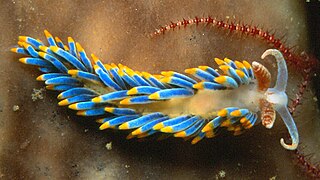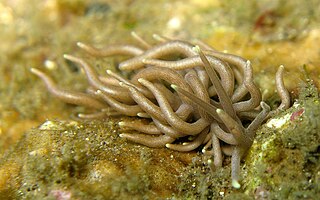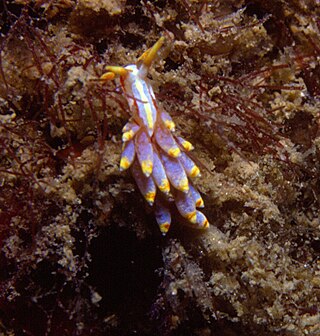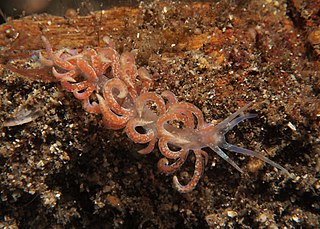
Nudibranchs belong to the order Nudibranchia, a group of soft-bodied marine gastropod molluscs that shed their shells after their larval stage. They are noted for their often extraordinary colours and striking forms, and they have been given colourful nicknames to match, such as "clown", "marigold", "splendid", "dancer", "dragon", and "sea rabbit". Currently, about 3,000 valid species of nudibranchs are known.

Phyllodesmium briareum is a species of sea slug, an aeolid nudibranch, a marine gastropod mollusc in the family Facelinidae.

Phyllodesmium is a genus of predatory sea slugs, aeolid nudibranchs, marine gastropod molluscs in the family Myrrhinidae.

Phyllodesmium longicirrum, common name the solar-powered phyllodesmium, is a species of sea slug, an aeolid nudibranch, a marine gastropod mollusc in the family Facelinidae.

Phyllodesmium crypticum is a species of sea slug, an aeolid nudibranch, a marine gastropod mollusc in the family Facelinidae.
William B. "Bill" Rudman is a malacologist from New Zealand and Australia. In particular he studies sea slugs, opisthobranch gastropod molluscs, and has named many species of nudibranchs.

Verconia is a genus of sea slugs, dorid nudibranchs, shell-less marine gastropod mollusks in the family Chromodorididae.

Pteraeolidia ianthina is a sea slug, an aeolid nudibranch in the family Facelinidae. It is known as a blue dragon, a name it shares with Glaucus atlanticus and Glaucus marginatus.

Phestilla melanobrachia is a species of sea slug, an aeolid nudibranch, a marine gastropod mollusk in the family Trinchesiidae.
Phyllodesmium pecten is a species of sea slug, an aeolid nudibranch, a marine gastropod mollusc in the family Facelinidae.

Coryphellina albomarginata is a species of sea slug, an aeolid nudibranch, a marine gastropod mollusc in the family Flabellinidae.

Trinchesia genovae is a species of sea slug, an aeolid nudibranch, a marine gastropod mollusc in the family Trinchesiidae.
Thomas Everett Thompson PhD DSc FZS was a British malacologist and embryologist, known for his extensive studies on opisthobranch molluscs.

Baeolidia salaamica, is a species of sea slug, an aeolid nudibranch. It is a marine gastropod mollusc in the family Aeolidiidae.

Phestilla lugubris is a species of sea slug, an aeolid nudibranch, a marine gastropod mollusk in the family Trinchesiidae.

Phestilla sibogae is a species of sea slug, an aeolid nudibranch, a marine gastropod mollusk in the family Trinchesiidae. The species feeds on the hard coral genus Porites.

Phestilla minor is a species of sea slug in the Trichechidae family. It is a type of aeolid nudibranch under the Aeolidina suborder. Phestilla minor is a benthic sea slug that is a very small, slow-moving organism found in marine habitats all over the world.
Phestilla panamica is a species of sea slug, an aeolid nudibranch, a marine gastropod mollusk in the family Trinchesiidae. The species feeds on the hard coral genus Porites.
Herviella cloaca is a species of sea slug, an aeolid nudibranch, a marine gastropod mollusc in the family Facelinidae.

Phyllodesmium poindimiei is an Alcyonacea feeding, aeolid nudibranch Gastropod belonging to the family Facelinidae. Cerata are important in this clade in terms of their physical defense and efficient metabolic processes. This species is spread sporadically along tropical coastal regions such as Australia, Hawaii, and the Indo-Pacific living in diverse marine habitats such as coral reefs. Unlike other species in the Opisthobranch Mollusca clade, P. poindimiei’s lush pink cerata are used for defensive purposes other than Nematocyst (dinoflagellate) capture and toxin release. Organismal ties within these thriving, tropical ecosystems can be determinants of environment change, which affects massive coral ecosystems. Continuously changing marine ecosystems, such as coral reefs, are directly linked to the evolution of organisms that live and thrive in the tropics such as the soft nudibrach P. poindimiei.













